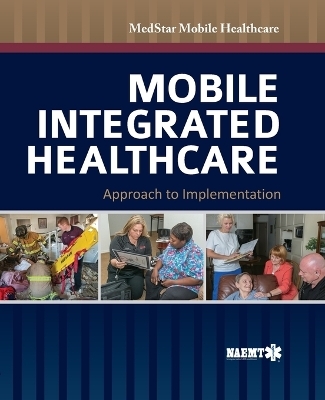
Mobile Integrated Healthcare: Approach To Implementation
Seiten
2014
Jones and Bartlett Publishers, Inc (Verlag)
978-1-4496-9016-8 (ISBN)
Jones and Bartlett Publishers, Inc (Verlag)
978-1-4496-9016-8 (ISBN)
The healthcare landscape in the United States is evolving rapidly but has largely ignored EMS, until recently. As the country focuses on cost containment and more appropriate methods to deliver services as a result of healthcare reform, EMS will need to undergo dramatic change to fill a new role in the healthcare system. The current traditional delivery method for EMS is financially unsustainable and will soon not be a viable option for care. EMS has a choice to make—adapt to the new environment or be left behind.
A viable alternative to the current structure of EMS is Mobile Integrated Healthcare (MIH)—community-based health management that is fully integrated with the overall health system. Various programs like this have appeared across the United States, but a definitive resource that describes how to successfully implement such a program has not been available. Mobile Integrated Healthcare: Approach to Implementation fills this void by serving as a reference not only to the EMS community, but also to other medical professionals working toward implementation of a successful MIH program.
Mobile Integrated Healthcare: Approach to Implementation provides a step-by-step approach for the identification of community needs, forming the appropriate partnerships, selection of staff, acquiring resources, patient identification, and overcoming hurdles to a successful program. Examples from successful programs across the country are included.
The author team of Mobile Integrated Healthcare: Approach to Implementation has developed and implemented a functioning, successful program. Their experiences with community partners and other healthcare specialists provide a broad-based view of the future of EMS in the healthcare industry.
Mobile Integrated Healthcare: Approach to Implementation is written by leaders in the field of EMS who are committed to guiding the successful evolution of EMS. Their approach to integration should be considered by EMS management, hospital-based social workers, and community partners such as county health authorities, homeless coalitions, and psychiatric services.
The type of care EMS providers give needs to evolve with the changing landscape of healthcare. This text describes how healthcare professionals and community partners can work together to facilitate that change and define a successful MIH program.
A viable alternative to the current structure of EMS is Mobile Integrated Healthcare (MIH)—community-based health management that is fully integrated with the overall health system. Various programs like this have appeared across the United States, but a definitive resource that describes how to successfully implement such a program has not been available. Mobile Integrated Healthcare: Approach to Implementation fills this void by serving as a reference not only to the EMS community, but also to other medical professionals working toward implementation of a successful MIH program.
Mobile Integrated Healthcare: Approach to Implementation provides a step-by-step approach for the identification of community needs, forming the appropriate partnerships, selection of staff, acquiring resources, patient identification, and overcoming hurdles to a successful program. Examples from successful programs across the country are included.
The author team of Mobile Integrated Healthcare: Approach to Implementation has developed and implemented a functioning, successful program. Their experiences with community partners and other healthcare specialists provide a broad-based view of the future of EMS in the healthcare industry.
Mobile Integrated Healthcare: Approach to Implementation is written by leaders in the field of EMS who are committed to guiding the successful evolution of EMS. Their approach to integration should be considered by EMS management, hospital-based social workers, and community partners such as county health authorities, homeless coalitions, and psychiatric services.
The type of care EMS providers give needs to evolve with the changing landscape of healthcare. This text describes how healthcare professionals and community partners can work together to facilitate that change and define a successful MIH program.
| Verlagsort | Sudbury |
|---|---|
| Sprache | englisch |
| Gewicht | 284 g |
| Themenwelt | Medizin / Pharmazie ► Gesundheitswesen |
| Medizin / Pharmazie ► Medizinische Fachgebiete ► Notfallmedizin | |
| ISBN-10 | 1-4496-9016-5 / 1449690165 |
| ISBN-13 | 978-1-4496-9016-8 / 9781449690168 |
| Zustand | Neuware |
| Haben Sie eine Frage zum Produkt? |
Mehr entdecken
aus dem Bereich
aus dem Bereich
1000 kommentierte Prüfungsfragen
Buch (2023)
Thieme (Verlag)
100,00 €


